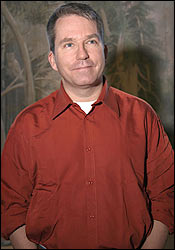
Dave King’s debut novel, The Ha-Ha, is about Howard Kapostash, a Vietnam veteran who returns after his tour of duty unable to speak, read, or write—and decades later attempts to become a surrogate dad to his ex-girlfriend’s son. Little, Brown’s lead fiction title this winter, The Ha-Ha has gotten the sort of shop-talk buzz and early reviews (“a writer to watch”) that tend to greet wunderkinds in their twenties. Boris Kachka asked the 48-year-old Brooklyn resident about his roundabout path to getting his first novel published.
How did you relaunch your writing career?
Any false starts earlier in life? I was a wild kid. I did write a novel when I was a teenager, in pencil in a little steno pad. I always had projects that I was interested in, but I didn’t know what to do with them. I wrote a screenplay for the Genet novel Querelle when I was about 19. I mailed it to David Bowie, and I wrote him a little stupid letter: “This would be a great project for you. Let me know if you want to do it.” I was kind of clueless. I took the same attitude toward what I did that maybe people in that era took toward macramé belts. “Oh, here’s something I can do.”
So how did The Ha-Ha come about?
My brother Hank was autistic; he was six years older than me. When Hank was alive, I never imagined him going to Vietnam. There were suggestions that if he hadn’t been autistic, he would have been the golden boy—big and strong and good-looking and sweet-tempered. When he passed away in 1993, I began for the first time to contemplate what his life could have been like. I remember thinking, He was the one who would have had to deal with Vietnam. And that intrigued me.
You’re coming on the tail end of a wave of books with disabled (or dead) narrators—Motherless Brooklyn, The Curious Incident of the Dog in the Night-time, The Lovely Bones. What’s with that trend?
I don’t know whether a handful of books spread out over half a decade constitutes a trend. I think it certainly suggests that people are responsive to works of the imagination.
Do you think there’s just too many of those impaired-narrator books?
I don’t think there are ever too many books. I don’t like to cook, I don’t buy cookbooks; I work out my own problems, I don’t buy self-help books. But I’m not willing to say that those things shouldn’t exist. I’m willing to say that nuclear weapons shouldn’t exist. I’m willing to say that cozy deals between corporate heads and government officials should not exist, but I’m not going to slam books.
The Ha-Ha.
Little, Brown $23.95
